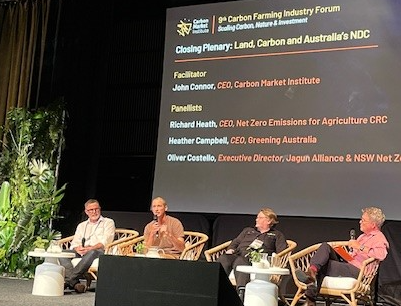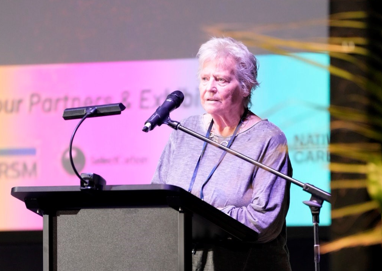During his opening of the 9th annual Carbon Farming Industry Forum in Northern NSW today, CMI’s CEO John Connor reflected on the results of the federal election and outlined priorities to progress policy certainty and a new roadmap for boosted investment in carbon, climate and nature.
“After the election on the weekend, the Albanese Government has a clear mandate from the Australian voters to continue their climate policy development and implementation. There are several policies and reforms which in recent times have been lagging in implementation. Now is the time to address these with renewed vigour,” said John Connor, CEO CMI.
Connor also reflected on the themes of the 2-day Forum: the role of carbon crediting in supporting decarbonisation and setting goals for reversing deforestation, ecological restoration and carbon removal, as well as how to grow ‘carbon for nature’ opportunities.
“Initial results from research commissioned by CMI shows there is a real opportunity to combine climate and nature repair goals and still assure food security and economic land management opportunities for Australia,” said Connor.
“Previous modelling results have shown that for Australia to help in the most ambitious Paris Agreement goal of limiting global warming to 1.5C, Australia would need at least an eight-fold increase in land-based carbon sequestration, alongside accelerating industrial decarbonisation.”
Our latest research is combining nature as well as climate goals committed to by the previous Albanese Government. Governments at all levels and the industry will need to step up to ensure these goals can be sustainably achieved with durable social licence and beneficial partnerships with farmers, traditional owners as well as other landholders and communities.
Australia’s land sector is currently its largest carbon sink. Investment in activities to reduce emissions and sequester or store carbon through changed livestock management, revegetation and soils management are incentivised through Australia’s carbon and emerging nature repair credit markets. CMI launched its first Carbon Farming Industry Roadmap in 2017 and updated that in 2022 with work underway for a third edition integrating the nature repair industry.
While farmers and land managers have significant potential to lead Australia’s climate change response, they are also at the forefront of impacts such as more extreme, less predictable weather events.
“Aside from broader policy discussions, this Forum provides a good opportunity to review progress on integrity reforms and the proponent-led method development one year after Minister Bowen announced this policy at our Forum,” said Connor.
“I would like to thank the forum’s primary supporter the NSW Government and would like to extend this also to all of our sponsors, presenters and attendees. I look forward to the next two days of debate and discussion. This will inform important upgrades and nature repair industry integration in our Carbon Farming Industry Roadmap as well as net zero planning for the land and agriculture sector at state and national levels,” concluded Connor.
Follow this link to access the speech.



